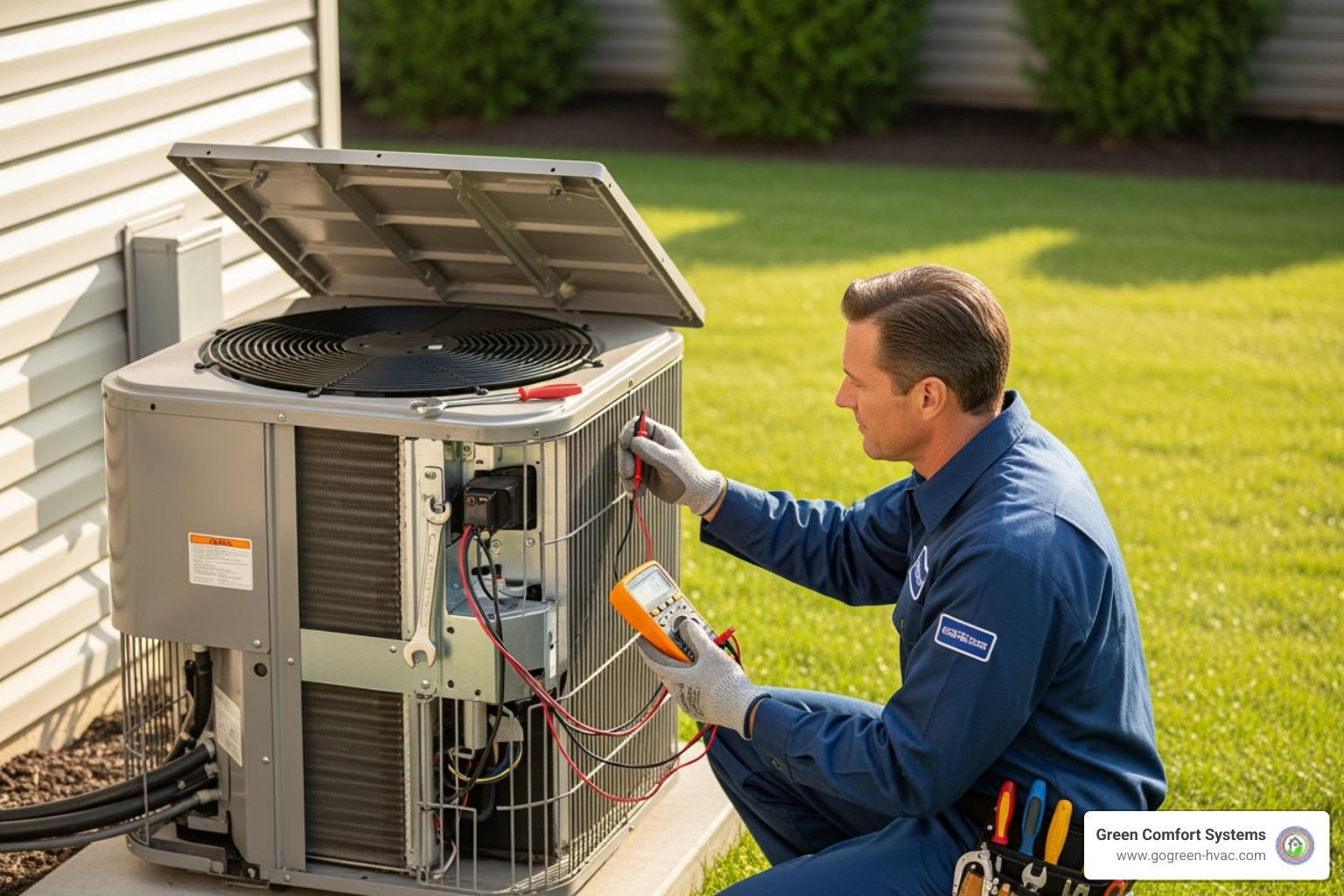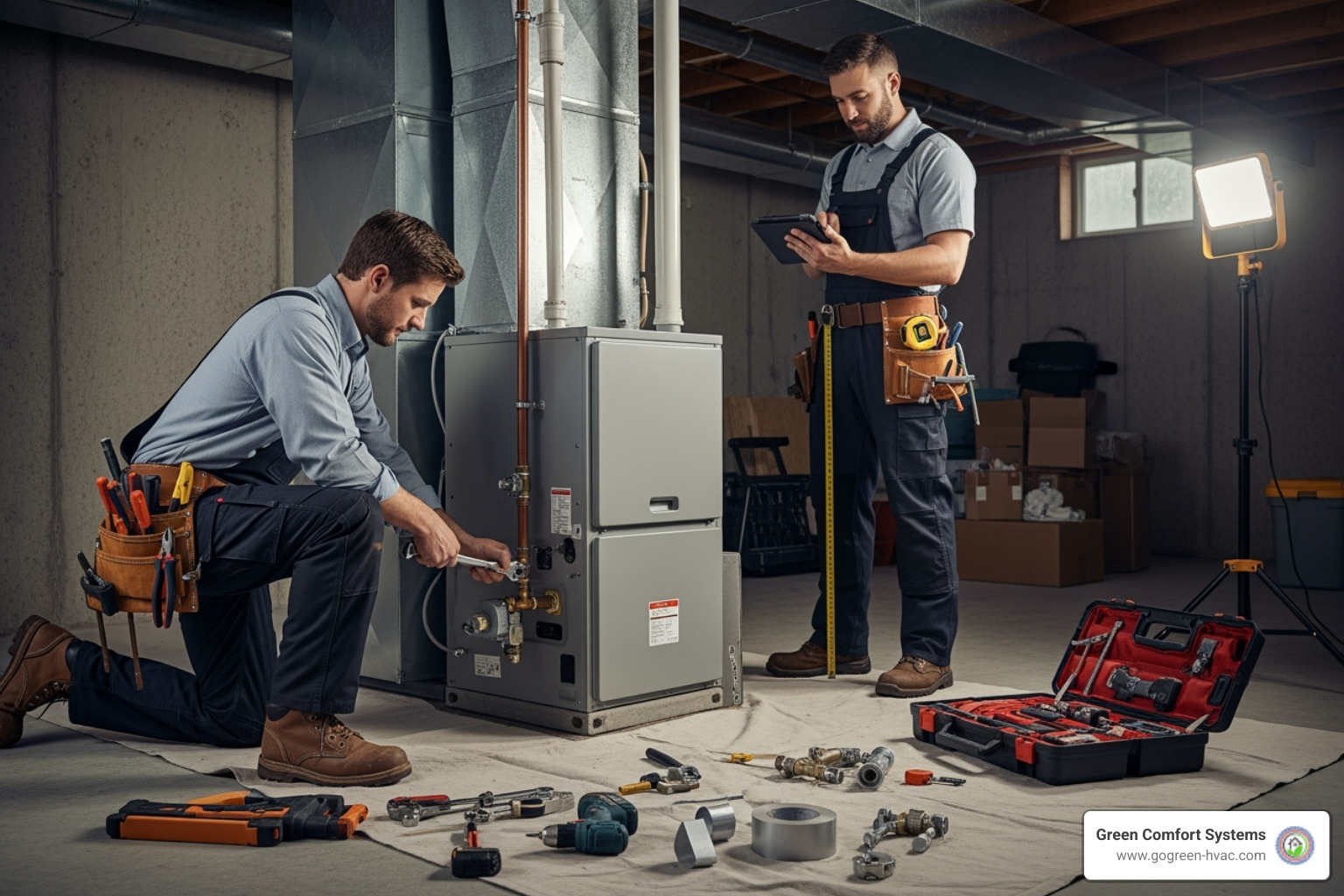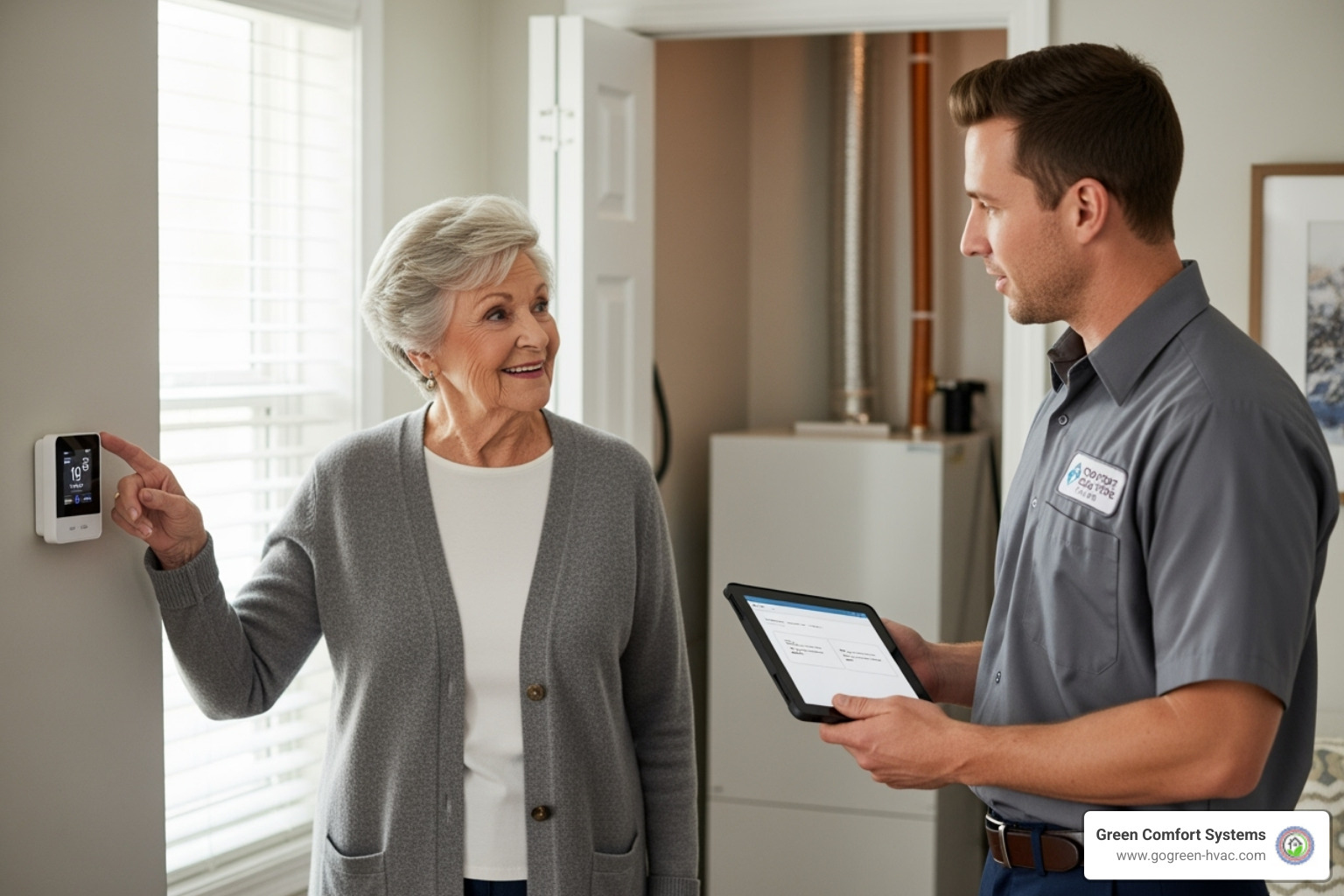Beyond the Ducts: Exploring Ductless Mini-Splits and More

Why an HVAC System Upgrade Transforms Your Home Comfort
An HVAC system upgrade can dramatically improve your home's comfort, energy efficiency, and value. Whether you're dealing with rising energy bills, frequent repairs, or uneven temperatures throughout your home, upgrading your heating and cooling system offers immediate and long-term benefits.
Key benefits of an HVAC system upgrade include:
- Energy savings - Up to 35% lower annual energy costs with modern, high-efficiency equipment
- Improved comfort - Better temperature control and humidity management throughout your home
- Higher home value - Energy-efficient HVAC upgrades can add $10,000 or more to your home's value
- Better air quality - Advanced filtration systems remove more dust, allergens, and pollutants
- Reduced repairs - New systems require fewer repairs and offer greater reliability
Modern HVAC technology has come a long way. Today's systems use variable-speed technology, smart controls, and advanced refrigerants to deliver superior performance while using less energy. According to the U.S. Department of Energy, homeowners should consider replacing their air conditioner or heat pump every 10 years to maintain optimal efficiency.
For homeowners in Rosedale, MD, dealing with aging systems or frequent breakdowns, an upgrade isn't just about comfort - it's about peace of mind. New systems come with warranties, predictable performance, and the reliability you need during Maryland's hot summers and cold winters.
Whether you're exploring traditional central air systems, energy-efficient heat pumps, or innovative ductless mini-splits, understanding your options helps you make the best choice for your home and budget.
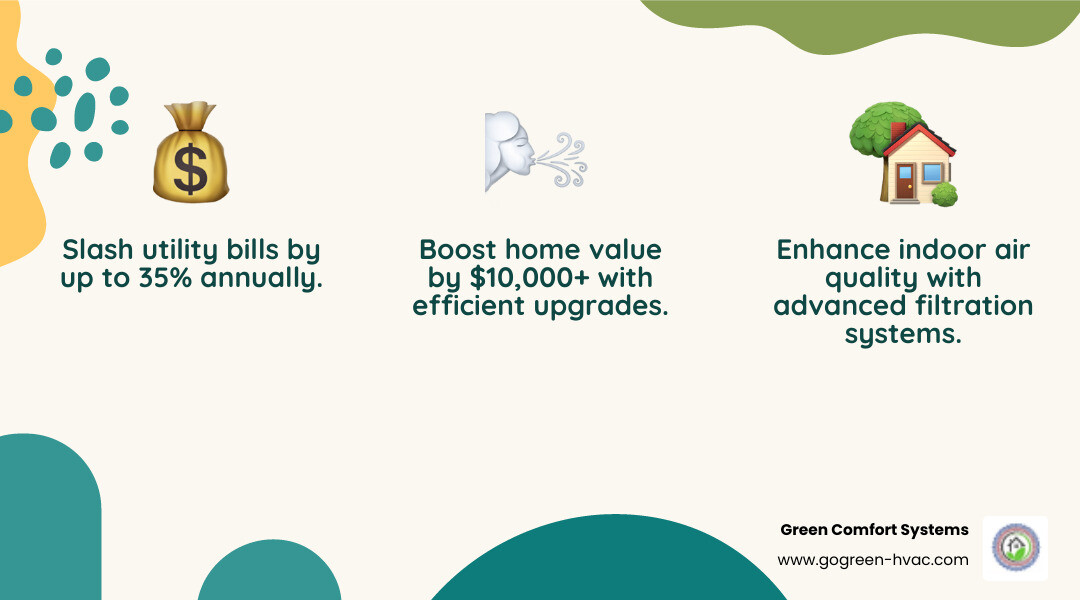
Is It Time for an Upgrade? Key Signs Your HVAC System is Fading
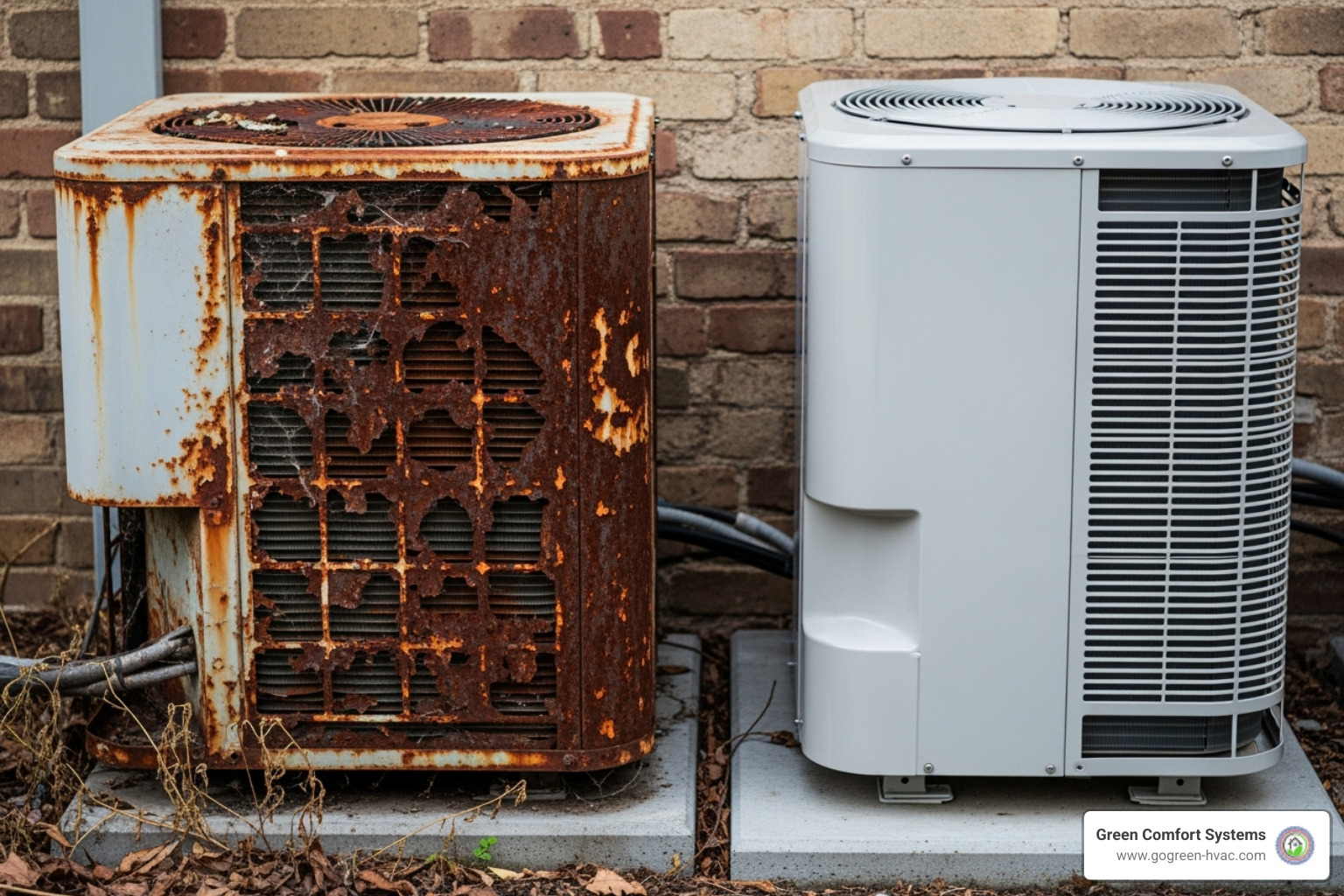
Like any major appliance, HVAC systems show their age. While they may have served you well, there comes a point when frequent issues and rising costs make replacement a smarter choice. Recognizing the signs early can save you from discomfort, unexpected breakdowns, and high utility bills.
One of the most obvious indicators is system age. The U.S. Department of Energy recommends that homeowners consider replacing their air conditioner or heat pump every 10 years. While many systems can last 10-15 years or even longer with diligent maintenance, their efficiency often declines significantly after a decade. If your system is approaching or has exceeded this timeframe, it's a good idea to start thinking about an HVAC system upgrade.
Are you calling for repairs more often? Frequent repairs are a clear signal that your system is failing. Minor fixes can escalate into major component failures, leading to increasing costs. Eventually, the cumulative cost of repairs can outweigh the investment in a new, reliable system.
A painful sign for any wallet is rising energy bills. As HVAC systems age, their components wear down, causing a drop in efficiency. They work harder to heat or cool your home, consuming more energy. We've seen cases where upgrading to a new variable speed unit reduced an electric bill by 65% while running the AC more often at lower temperatures! That's a serious saving that adds up.
Are some rooms always too hot while others are too cold? This uneven heating and cooling is a classic symptom of an aging system struggling to distribute air effectively or problems with ductwork. It's a clear sign your system isn't providing consistent comfort.
If your HVAC system is making strange noises – grinding, squealing, banging, or persistent rattling – it's often a cry for help. These noises can indicate worn-out parts, loose components, or even compressor issues, all of which can be precursors to a major breakdown.
Finally, consider poor air quality and humidity issues. An aging system may not filter air effectively, circulating more dust and allergens. If your home feels too humid in summer or too dry in winter, your HVAC may be struggling to maintain proper humidity levels. These issues affect not just comfort, but also your health and home.
If you're experiencing any of these signs, it's a strong indication that it's time to explore the benefits of a modern HVAC system upgrade.
The Transformative Benefits of a Modern HVAC System Upgrade
When you invest in a modern HVAC system upgrade, you're not just replacing old equipment - you're changing your entire home experience. The benefits ripple through every aspect of your daily life, from the money you save each month to the air your family breathes.
Boost Energy Efficiency and Slash Utility Bills
The most popular benefit is lower utility bills. Modern HVAC systems are far more efficient than older models. Homeowners can save up to 35% on their annual energy costs after upgrading—that's real money back in your pocket.
Today's high-efficiency models use smart technology like variable-speed systems that adjust their power based on what your home actually needs. Instead of blasting at full power then shutting off, these systems run at various speeds to maintain comfort while using less energy.
Smart thermostats take this efficiency even further. They learn your schedule and preferences, automatically adjusting temperatures when you're away and having your home perfectly comfortable when you return. You can even control them from your phone, so you'll never waste energy heating or cooling an empty house again.
All this efficiency adds up to a reduced carbon footprint too. You'll feel good knowing your comfort isn't costing the planet.
Here's how the numbers look:
| Feature | 15-Year-Old Unit (e.g., 10 SEER) | New ENERGY STAR Model (e.g., 16 SEER) |
|---|---|---|
| Energy Usage | High | Significantly Lower |
| Efficiency | Low (due to age & design) | High |
| Comfort | Uneven, less consistent | Consistent, precise temperature |
| Noise Level | Often louder | Quieter operation |
| Utility Bills | Higher | Lower |
Want to see exactly how much you could save? Check out this SEER Energy Savings Calculator for Air Conditioners to compare your current system with a new one.
Improve Indoor Air Quality and Family Health
An HVAC system upgrade can make your home a healthier haven through dramatically improved filtration. Modern systems capture far more dust, pollen, and allergens than older equipment. If you've been battling pet dander allergies, a new system with advanced filtration can be life-changing.
HEPA filters take air cleaning to the next level, capturing 99.97% of airborne particles. That means fewer sneezes, less dusting, and cleaner air for your family to breathe.
Humidity control is another game-changer. Whole-home humidifiers prevent dry skin and static electricity in winter, while dehumidifiers stop that sticky summer feeling and prevent mold growth. Some systems even include UV light purifiers that use UV-C technology to eliminate bacteria and mold before they can circulate through your home.
When your HVAC system properly manages both air quality and humidity, your home will feel fresher, cleaner, and more comfortable year-round.
Increase Home Value and Secure Your Investment
An HVAC system upgrade is one of the smartest investments for your home. Today's buyers are savvy about energy efficiency and recognize a quality HVAC system.
Energy-efficient upgrades can add $10,000 or more to your home's resale value. Adding central air to a home that doesn't have it can increase value by up to 10%. Even HVAC zoning systems, which let you control different areas of your home independently, can boost your home's worth by around $5,000.
The buyer appeal is undeniable. When potential buyers see a new, efficient HVAC system, they see comfort, reliability, and lower utility bills. They also see one less major expense they'll need to worry about for years to come.
Opening Financial Incentives for Your Upgrade
An HVAC system upgrade is a significant investment, but several incentives can make it more affordable. Smart homeowners use available rebates to offset upfront costs.
Federal tax credits are available for many energy-efficient HVAC purchases. These are dollar-for-dollar credits that reduce what you owe in taxes.
Local utility programs often provide cash rebates for upgrading to high-efficiency systems. Here in Maryland, programs like the EmPOWER Maryland Low Income Energy Efficiency Program (LIEEP) help eligible households with energy-efficient upgrades.
Many HVAC companies also offer special financing options that make monthly payments manageable. This allows you to enjoy the benefits of your new system right away while spreading the investment over time.
The combination of energy savings, increased home value, and available incentives often makes an HVAC system upgrade pay for itself faster than you might expect.
Navigating Your Options: From Traditional to Ductless Systems
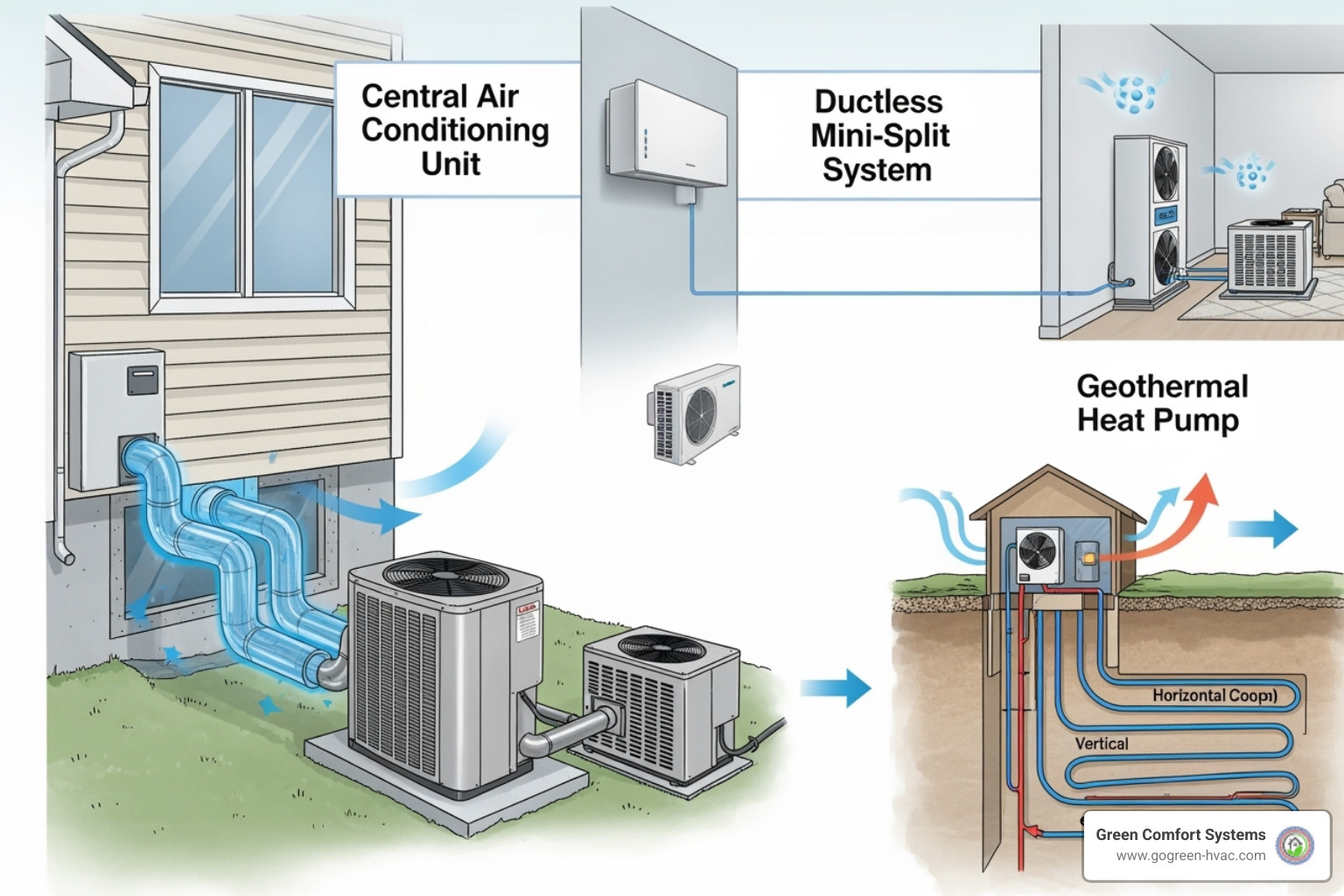
When you're ready for an HVAC system upgrade, the choices can feel overwhelming. The good news is that today's technology offers solutions for every home, from brand-new construction to century-old historic properties. Understanding your options helps you make the best decision for your comfort, budget, and home's unique needs.
Core Components You Can Upgrade
You don't always need to replace your entire HVAC system at once. Sometimes, upgrading just one or two key components can make a dramatic difference.
Your furnace provides winter heating, typically powered by natural gas, propane, or electricity. Its efficiency rating (AFUE) tells you how much fuel heats your home versus what's wasted. Modern furnaces are incredibly efficient compared to older models.
The air conditioner cools your home by pulling heat out and sending it outside. Look for the SEER2 rating – the higher the number, the more efficient the cooling. Your heat pump is a two-in-one system that can both heat and cool by moving heat around. This makes heat pumps incredibly energy-efficient, especially in Maryland's moderate climate.
Don't overlook your ductwork. If your ducts are leaky or poorly designed, you could be losing up to 30% of your system's efficiency. Your thermostat is the system's control center, and upgrading to a smart model can save energy even with an older system. The air handler and coils work together to move and condition the air that keeps you comfortable year-round.
A Look at Different HVAC System Types
Central forced air systems typically include a furnace for heating, an air conditioner for cooling, and ducts to carry conditioned air. These reliable systems are common, and new regulations are pushing furnace efficiency from the current 80% minimum to 95% by 2028.
Heat pumps are gaining popularity because they're incredibly efficient. Instead of burning fuel to create heat, they move existing heat from outside to inside. They handle both heating and cooling, making them perfect for Maryland's climate.
Ductless mini-splits are ideal for homes without existing ductwork or for adding comfort to specific areas. They allow you to keep different rooms at different temperatures without tearing up walls or losing closet space to ducts. They're perfect for home additions, converted garages, or rooms that are hard to heat or cool.
Geothermal systems tap into the Earth's stable underground temperature. While the initial installation requires more planning, they offer exceptional efficiency and can dramatically reduce your energy bills over time.
Boilers create cozy warmth by circulating hot water or steam through radiators or radiant floor systems. Modern boilers achieve 90% or higher efficiency ratings, far surpassing older models.
VRF systems (Variable Refrigerant Flow) are sophisticated systems that can heat some rooms while cooling others simultaneously. They're becoming more popular in larger homes where different areas have very different heating and cooling needs.
For homes where a complete replacement isn't necessary, HVAC retrofit solutions can integrate new, efficient components with existing systems, giving you better performance without starting from scratch.
Special Considerations: Retrofitting Older and Historic Homes
Upgrading HVAC systems in older homes requires balancing modern comfort and efficiency with the preservation of the home's character and architectural integrity.
Space constraints are often the biggest challenge. Older homes weren't built with today's ductwork in mind, so running large ducts isn't always practical. That's where mini-duct systems and high-velocity systems are useful. These use much smaller, flexible ducts that can snake through existing walls with minimal disruption to original plaster or woodwork.
Ductless mini-splits are often the perfect solution for historic homes. Since they don't require any ductwork, installation is minimally invasive. You can add comfort to specific rooms without affecting the home's historic fabric. They're also incredibly quiet, so they won't disturb the peaceful ambiance of your historic space.
At Green Comfort Systems, we understand every older home is unique. Our retrofitting approach respects your home's character while upgrading it with modern comfort and efficiency. We work carefully to preserve what makes your home special while ensuring year-round comfort.
The Smart Approach to Your HVAC System Upgrade
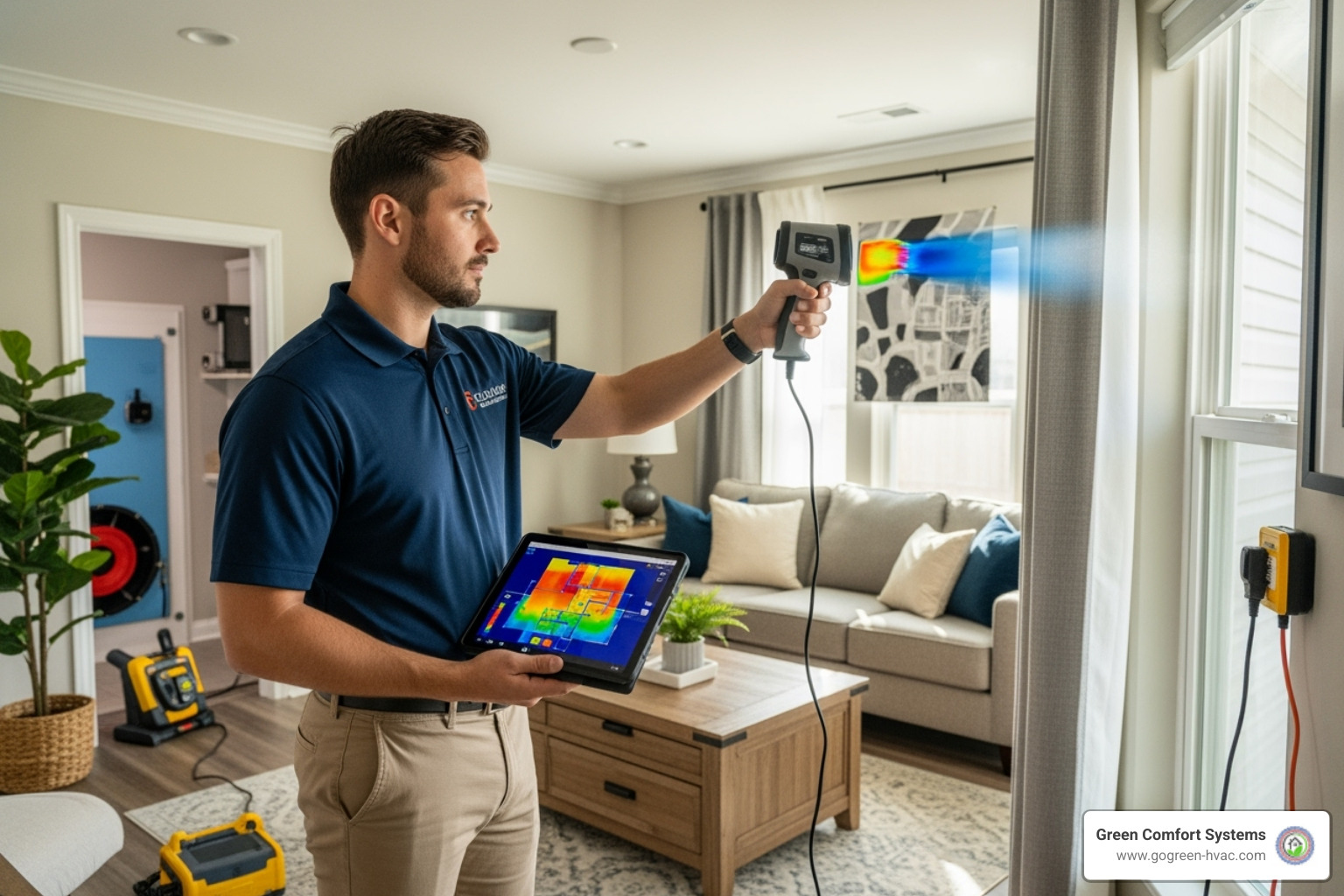
Properly planning your HVAC system upgrade is the key to changing your home's comfort and efficiency. A solid foundation is crucial for getting the best results from your new system.
Rushing into an upgrade without proper preparation can lead to disappointment. We guide our customers through a proven process to ensure they get maximum comfort, efficiency, and value from their investment.
Step 1: The Pre-Upgrade Checklist
Before we talk about which new system to install, we need to ensure your home is ready to make the most of it. A new system's efficiency is wasted if your home isn't properly sealed and insulated.
A home energy audit reveals where your home is losing heated and cooled air. Up to one-third of heating and cooling energy can escape through poor insulation. The Energy Department provides guidance on weatherproofing that can save homeowners up to 20% on energy bills.
Air sealing and insulation improvements often pay for themselves quickly. These upgrades can sometimes allow for a smaller, less expensive HVAC system than originally planned.
A ductwork inspection is also crucial. Leaky ducts can waste more than 30% of your system's efficiency! We always check for loose connections, holes, and poor insulation in ductwork before recommending an HVAC system upgrade.
Step 2: Understanding Efficiency Ratings for Your HVAC system upgrade
Efficiency ratings can seem complex, but they are your roadmap to long-term savings. Higher numbers mean lower operating costs.
SEER2 (Seasonal Energy Efficiency Ratio 2) is the updated standard that better reflects real-world performance for air conditioners and heat pumps. As of January 2023, new systems must meet minimum SEER2 requirements - 13.4 SEER2 for air conditioners in our region. Higher SEER2 numbers mean greater efficiency and lower cooling costs.
For heating systems, AFUE (Annual Fuel Utilization Efficiency) tells you how much of your fuel actually heats your home. A furnace with 90% AFUE converts 90% of its fuel into heat. Current regulations require furnaces to reach at least 80% AFUE, but new rules will push that to 95% minimum by 2028.
HSPF (Heating Seasonal Performance Factor) measures how efficiently heat pumps warm your home. Since heat pumps are increasingly popular in Maryland, this rating helps you compare heating performance.
We always recommend looking for Energy Star certification when choosing your new system. These products meet strict efficiency guidelines and often qualify for rebates and tax credits. While higher efficiency typically means higher upfront costs, the energy savings usually pay for themselves over time.
Step 3: The Path from Assessment to Installation
Once your home is prepared and you understand the efficiency landscape, the real work begins. This is where professional expertise is invaluable.
Our professional consultation starts with a detailed assessment using Manual J calculations to properly size your system. This engineering process considers your home's square footage, insulation, windows, and Maryland's climate. An oversized system will short-cycle, wasting energy, while an undersized system will run constantly.
Permitting protects you and your investment. Local codes ensure your installation meets safety standards and operates efficiently. We handle all the paperwork so you don't have to worry about compliance.
The installation process is where our licensed technicians excel. Every connection matters—from refrigerant lines to electrical connections to ductwork sealing. Proper installation delivers the efficiency and comfort your new system promises.
Post-installation checks and commissioning are our final quality control steps. We test airflow, verify refrigerant levels, and calibrate controls to ensure everything operates as designed. This attention to detail ensures you get the efficiency and comfort you paid for.
Your HVAC system upgrade is an investment in your family's comfort for years to come. Taking the smart approach ensures you'll enjoy reliable, efficient operation and maximum energy savings from day one.
Frequently Asked Questions About HVAC Upgrades
We know that considering an HVAC system upgrade brings up lots of questions. After helping countless families in Rosedale, MD improve their home comfort, we've heard just about every concern you might have. Let's tackle the big ones together.
How much does a new HVAC system cost?
The cost of an HVAC system upgrade varies because every home is different.
The final price depends on several factors. System type makes a big difference - a basic central air system will cost differently than a high-end heat pump or ductless mini-split setup. Size matters too, because we need to match your system perfectly to your home's square footage and layout.
Higher efficiency ratings (SEER2, AFUE, HSPF) mean better performance and lower bills, but they do come with a higher upfront investment. Your home's characteristics also play a role, such as whether your ductwork or electrical systems need updating.
Installation complexity can also affect the cost. That's why we perform a thorough evaluation of your Rosedale home to provide a comprehensive estimate, ensuring you get the best value and an expert installation.
How long does an HVAC installation take?
Most HVAC system upgrades take between one to three days to complete. We work efficiently to get your home back to normal as quickly as possible without cutting corners.
A straightforward replacement of similar equipment is usually faster, especially if your existing ductwork is in good shape. Projects like extensive ductwork modifications or installing a completely different type of system naturally take longer.
Working in challenging spaces like tight attics or crawl spaces can add time. We always provide a clear timeline during our consultation so there are no surprises.
Can I install a new HVAC system myself?
While the DIY spirit is admirable, an HVAC system upgrade is a job for professionals for several key reasons.
This work requires professional licensing and specialized tools that most homeowners don't have. More importantly, refrigerant handling requires special certification; it is illegal to handle refrigerants without proper credentials.
The safety hazards are real, including potential carbon monoxide leaks, electrical fires, and gas line issues. Plus, voided warranties mean you could lose thousands in coverage if something goes wrong with a self-installation.
Improper installation risks go beyond poor performance, leading to high energy bills, frequent breakdowns, and dangerous situations for your family.
We've seen the costly aftermath of DIY attempts. Trust us—calling a professional for this job saves money, time, and headaches in the long run.
Conclusion: A Greener, More Comfortable Home Awaits
An HVAC system upgrade is more than a home improvement project; it's a smart investment in your comfort, finances, and the planet. Imagine perfect temperatures, clean air, and lower utility bills. These benefits transform your home for years to come.
You'll enjoy long-term energy savings, breathe easier with improved air quality, and see your home's value increase. Plus, you’ll reduce your carbon footprint.
At Green Comfort Systems, we're passionate about your comfort and committed to environmental responsibility. For every service and installation, we plant trees, contributing to a greener future for our community in Rosedale, MD, and beyond.
We pride ourselves on providing fast, reliable HVAC services that ensure your home has perfect temperatures and clean air, no matter the season. If you're considering an HVAC system upgrade, or just want to chat about how we can help make your home more comfortable and energy-efficient, we’d love for you to connect with us.
Book Expert Service Or Contact Us
Other Blogs





Get Financing Today
Get the comfort you deserve, without the financial stress.

Latest Blogs







